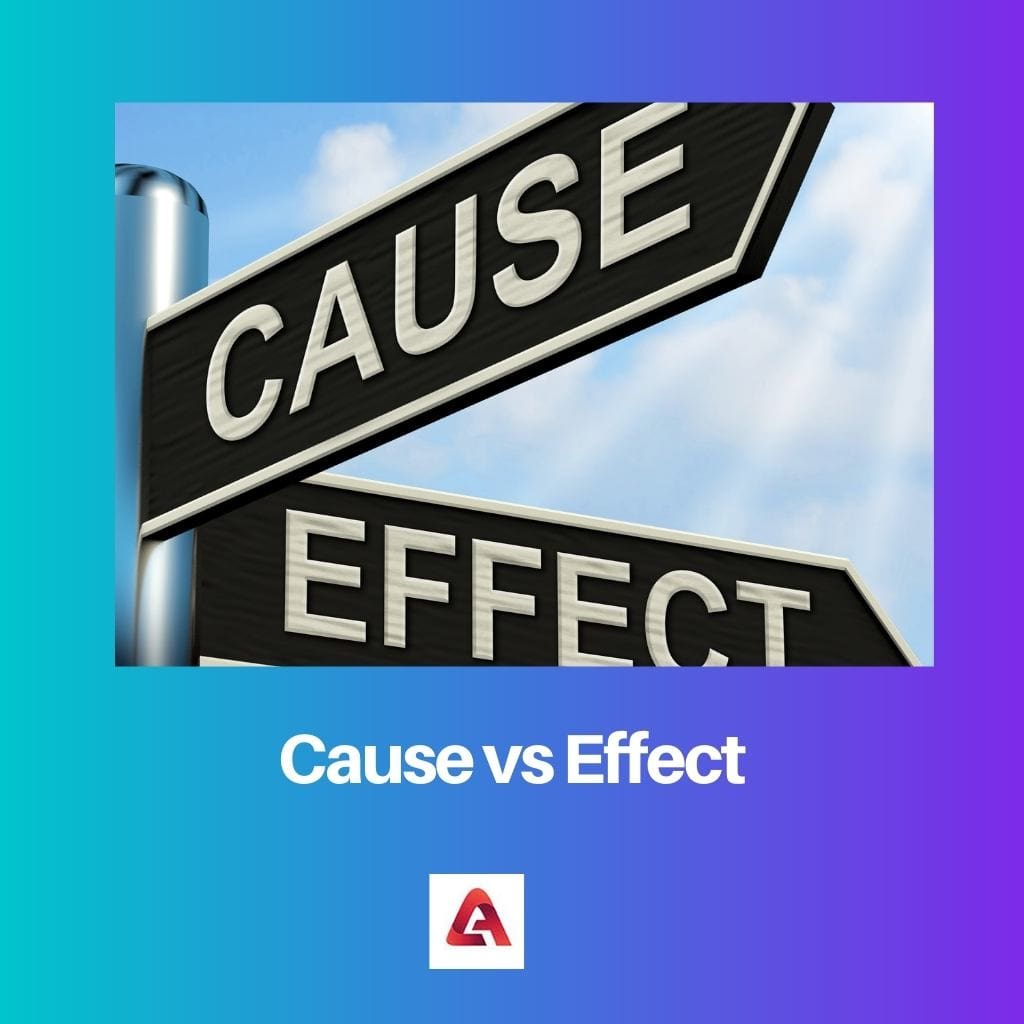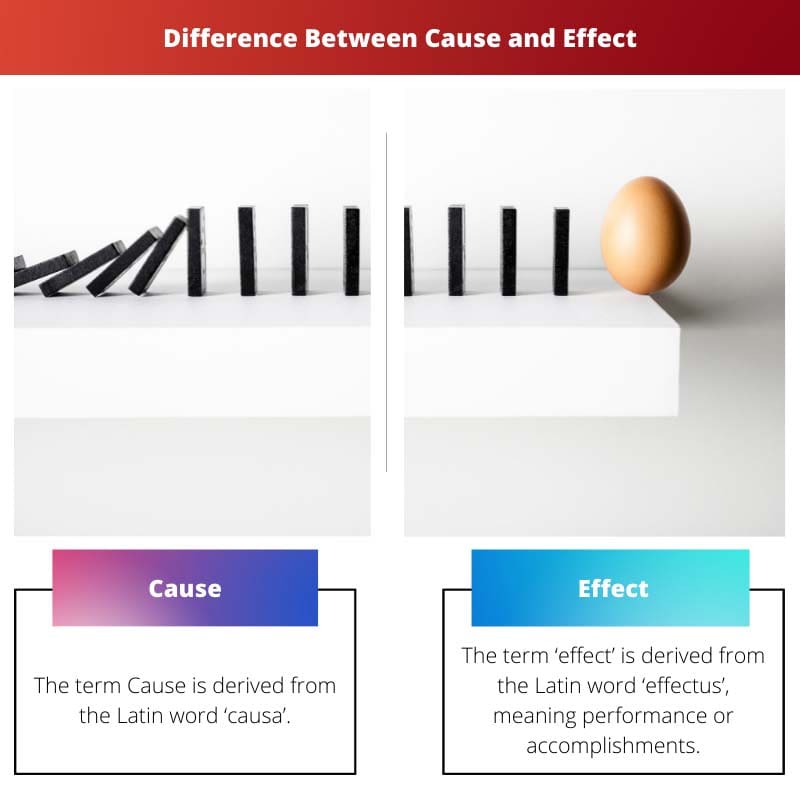For every reaction, there is an equal and opposite reaction. Newton’s third law of motion holds for all events happening around us.
For instance, if water boils to a gaseous state, it is because of the energy provided by heat or by reducing pressure.
Similarly, the momentum generated by the football player is transferred to the ball through the kick, which enables the ball to travel to a certain distance with a specific speed.
Some factors in the above two examples produced the desired effect. Those factors were said to be the cause for the event to take place.
The events resulting from the cause are said to be an effect. Effect and cause are two sides of the same coin. One does not exist without the other.
If something has happened, it will result from some direct or indirect cause. The cause may be known or sometimes remains hidden.
The origin of the cause could be many years back or a fraction of a minute. It depends on the nature of the cause.
So, it should be noted that if we cannot find a cause for the event, it does not mean that there is no cause behind that particular event.
Key Takeaways
- The cause is an action or event that brings about a result, while the effect is the result brought about by the cause.
- A cause can be either direct or indirect, while an effect is always direct.
- A single cause can have multiple effects, while a single effect can have multiple causes.
Cause vs Effect
The cause is why something happens, while the effect is the result or consequence of the cause. Causes are otherwise known as factors that contribute to an effect. Identifying these factors can help us understand and prevent the effect from happening and predict the outcome of events.

‘Cause’ is not specific to people alone. It can involve facts, objects, properties, processes, variables etc. There will be a cause behind the logic of the result of any incidents (effect).
Comparison Table
| Parameter of Comparison | Cause | Effect |
|---|---|---|
| Origin | From Latin | From Latin |
| Meaning (Noun Form) | The reason for something to happen. | The result of a particular event. |
| Meaning (Verb Form) | To serve or bring about a cause. | To make something happen. |
| Example of Noun Form | The cause of the incident is unknown. | The effect of less sleep will not be good. |
| Example of Verb Form | Deficiency in Vitamin-A a causes night blindness. | As a non-governmental organization, the founders focus on effecting a change in the framework for better results. |
What is Cause?
The term Cause is derived from the Latin word ‘causa’. This is a derivative of the noun form, which denotes a reason behind something happening.
It denotes a person, thing, fact or any process that acts in such a way that a particular event occurs due to the former.
As a noun, it means the reason for a condition or an action. The reason could be a person or an object. Consider the following example.
The leakage in the brake oil pipe was the cause of the accident.
In this statement, the term cause denotes the leakage (object). Here the reason for the accident to occur is due to the leakage in the pipe.
As a verb, the term cause means to serve as an occasion or cause of something. It brings about a certain effect when used as a verb. For instance, consider the next example.
Rash driving causes fatal accidents.
Here the term cause tells the user that rash driving leads to accidents. It denotes the event happening because of the former.
Often, the term cause is used to denote something bad happening. For example, a deficiency in vitamin B causes Beri Beri disease. This statement denotes an ominous thing to happen because of the lack of a particular vitamin.

What is Effect?
The term ‘effect’ is derived from the Latin word ‘effectus’, meaning performance or accomplishments. When used as a noun, it denotes a consequence produced due to a particular task.
An example of the above statement includes “Heating of the steel brought the desired effect needed for forging. Consider the following statements.
- The radiation leakage from the reactor led to a catastrophic effect on the surrounding area.
- The tablets did not produce any effect.
All these statements denote a result due to a certain influence(cause). It also denotes the state of being functional or operative.
For example, “He toiled day and night to transform a plan into effect”. In the media industry, it means the sounds and lightning used for a film to achieve a realistic feel.
When used in plural form, it means the properties, used to denote personal properties. When used as a verb, it denotes something to be accomplished.
For example, recent research on the defence system affected the transition of the military to a higher level.

Main Differences Between Cause and Effect
- ‘Cause’ is used to mention a catalyst which will produce a certain result. ‘Effect’ is something which has resulted due to a cause.
- Cause and effect go hand in hand. For an event to occur, there will be some direct or indirect cause; for every effect, a cause would be the initiator.
- Cause, as a noun, denotes the reason for an event to happen, whereas effect refers to a consequence or the result which has occurred.
- When used as a verb, ’cause’ represents something going to happen. Often it is used to mention some unpleasant things or incidents to happen. At the same time, effect means something to bring about or accomplish. In verb form, both the term cause and effect emphasize something happening.
- It is the cause which always leads to effect.

Last Updated : 11 June, 2023


Emma Smith holds an MA degree in English from Irvine Valley College. She has been a Journalist since 2002, writing articles on the English language, Sports, and Law. Read more about me on her bio page.

The article offers a comprehensive and in-depth exploration of the cause and effect relationship. It effectively differentiates between the two concepts and provides a thorough analysis of their characteristics, making it a highly insightful read.
I couldn’t agree more. The depth of analysis in this piece is truly exemplary.
The article provides a fundamental yet profound understanding of the cause and effect relationship, making it an intellectually stimulating read. I appreciate the clarity and depth of analysis in every aspect of the discussion.
The informative nature of this article is undeniably valuable, but perhaps a touch of humor or light-heartedness in the presentation could enhance its overall appeal to a wider audience.
I see your point, Megan. Injecting some humor could certainly make the content more engaging for a broader readership.
This article provides valuable insight into the concept of cause and effect, using relatable examples and explanations to illustrate the fundamental principles of this concept. I found it to be highly informative and thought-provoking.
I completely agree with you, Aiden. The comparisons and examples used certainly helped in better understanding of the topic.
This article has effectively communicated the differences between cause and effect, enhancing my understanding of these fundamental concepts.
While the article presents a wealth of information, I can’t help but feel that the comparison table could be more visually engaging. The addition of graphs or diagrams could greatly enhance the accessibility and appeal of the content.
I think the textual information itself is comprehensive enough. Visual aids might detract from the intellectual nature of the piece.
I see your point, Zsaunders. Visual aids can certainly enhance the overall readability and appeal of the article.
This article has certainly heightened my understanding of cause and effect, particularly through its detailed exploration of the origins and meanings of these concepts.
While the article does present a clear explanation of cause and effect, its overly formal tone may make it less accessible to a wider audience. It could benefit from a more conversational approach to cater to a broader readership.
I can see where you’re coming from, Scott. Making the content more relatable could engage a wider range of readers.
I’m of the opinion that the formal tone is necessary to maintain the gravity of the topic. It’s a matter of striking a balance between accessibility and intellectual depth.
The comparisons and detailed explanations in this article are commendable. It has certainly provided valuable insights into one of the most fundamental principles governing our world.
Absolutely, Dominic. The meticulous analysis in this piece is truly commendable.
I concur, Dominic. The depth of insight into these fundamental principles is indeed remarkable.
While the use of comparisons and examples is effective, the article may benefit from addressing potential rebuttals or counterarguments to provide a more well-rounded analysis of the cause and effect relationship.
I agree, Finley. Anticipating counterarguments could further strengthen the depth of analysis.
I think the article’s focus was more on establishing foundational understanding rather than engaging in debate. That being said, acknowledging counterarguments could add an interesting dimension to the piece.